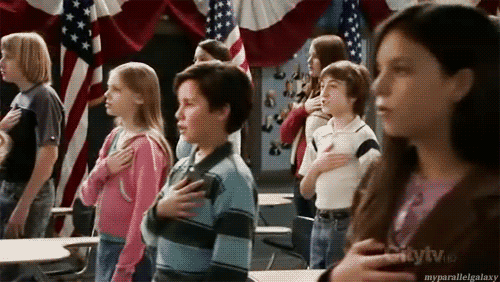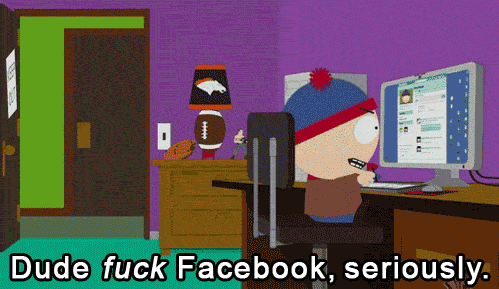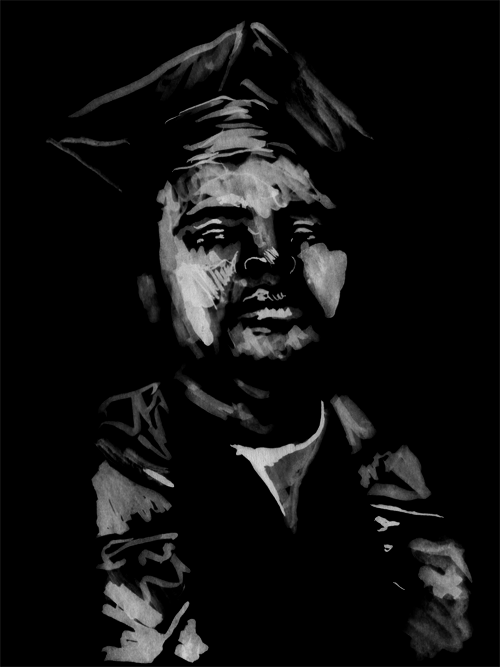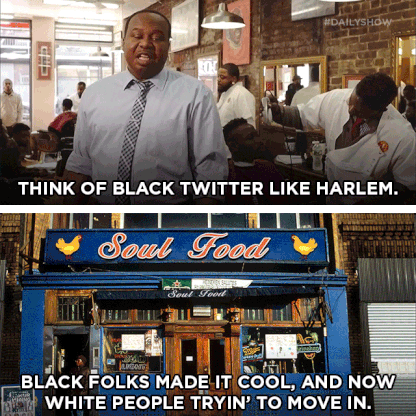
When I first joined twitter in 2009, I didn’t see the point. I, like pretty much everyone else who ventured onto the nubile social media platform from facebook, thought 140 characters was restrictive and fascist. So I retreated back to facebook for two years, surrounded comfortably by school acquaintances and friends of friends who regurgitated my own narrow view of the world. My interactions online were limited to people in my pocket of the South. There were no challenges to insults about skin color or retribution for non-black users casually saying nigga. There were no intellectual conversations, just nostalgic wall games and fight videos captured on antiquated flip camera phones.

During spring break of 2011, I began using twitter regularly. I was exposed to the same shit from facebook but in 140 character increments. But there was something else, too. There was “Shea Butter Twitter.” It was a facet of black twitter that I ogled from afar. All of my locals called them the wack, nappy, bitter, pro-black bitches- and that just wasn’t my style. Or at least at that time it wasn’t. I wore my hair permed and pressed. It was short and brittle from chemical heat damage, lank and boring like many other black girls before the natural movement took hold. I believed in black on black crime and I called girls who dared to have more self-confidence than me “slutty”. I played into respectability politics both as a woman and a black person, leaving a trail of ugliness that seems like a lifetime ago. I shudder thinking about all of the ignorance that lies on my twitter from 2011 to 2014. But I also feel pride about how I have grown. I wasn’t the only one, either. Black twitter sparked a revitalization of black empowerment and enlightenment for a lot of us.
It was a gradual process. The complaints I had about racism had long been shoved into the back of my brain, abandoned for my desire to never be “that” black person. The troublemaker. The nuisance. The one roasted in films as pro-black and illogical, conscious to the point of no return. The one who was a vibe killer. The one who was angry and bitter. After all, racism was over, as my 10th grade civics teacher informed me. So I swallowed microaggressions and discrimination with a smile on my face. That is, until black twitter. There my complaints about racism were affirmed. Patterns of discrimination were identified. I realized that I wasn’t alone. Condescending white women and entitled white men were not unique to me in Charlotte, North Carolina.
Like a woman’s body during effective foreplay, twitter discourse stimulated me into full on arousal. Things that I used to scroll past on the timeline suddenly held my attention. I followed new accounts. Instead of automatically rejecting ideas that seemed absurd, I looked further into them. By this time I was in college, and taking advantage of Ohio State’s resources for further enlightenment became crucial. I picked up new information and read new books. I stopped perming my hair and began taking the concept of police brutality seriously. In my classes, where I had initially decided to not be a troublemaker, I began to not care about white feelings. All the while, I watched the tragedies of Trayvon Martin, Mike Brown and Tamir Rice blaze across my timeline, ingesting each appalling twist and turn with my black  twitter peers. We all watched in horror as media outlets, celebrities, and politicians justified police brutality and black discrimination. With each high profile case my mentality became more serious and my vision a little clearer. I didn’t know it, but my life’s purpose was revealing itself to me. Inside, I was changing. My views no longer lined up with things I came to believe in childhood. Celebrities I used to love became stale pieces of my past obsession with superficial fame and hunger for money. Certain kinds of jokes were no longer funny. I became less judgemental. Black love bubbled inside of me. Arguments on my timeline about skin color, higher education choice, and why white lovers were better than black ones sickened me.
twitter peers. We all watched in horror as media outlets, celebrities, and politicians justified police brutality and black discrimination. With each high profile case my mentality became more serious and my vision a little clearer. I didn’t know it, but my life’s purpose was revealing itself to me. Inside, I was changing. My views no longer lined up with things I came to believe in childhood. Celebrities I used to love became stale pieces of my past obsession with superficial fame and hunger for money. Certain kinds of jokes were no longer funny. I became less judgemental. Black love bubbled inside of me. Arguments on my timeline about skin color, higher education choice, and why white lovers were better than black ones sickened me.
Black twitter was the catalyst of my metamorphosis from ignorant and self-hating to informed and pro-black. It’s where I got unfiltered and FREE information. When the Black Panther Party formed a weekly newsletter, they did so because they knew controlling the narrative and chin checking mainstream media was crucial. On twitter, that is what we do. We share information and critique. Whether people like it or not. Between thirst traps, fly out stories, and pictures of food, there are conversations happening that we can not get anywhere else. It hasn’t always been so pro-black and intellectual on twitter, but the only ones complaining about how it is now are the brainwashed and the enemy. You know who I’m talking about. There are a slew of black twitter users who love to say that twitter isn’t real life. Half of them are users who have been causing timeline havoc since the days of twitter jail and #teamfollowback, 30somethings who tweet daily for hours on end but still claim the app isn’t a real part of their lives. The others are transplants from facebook or recent high school graduates pushing pyramid schemes who capitalize every word of their tweets and seem to not know how to pluralize “feminist”. “Twitter used to be so much fun,” they whine, furious that they can’t joke about rape or call dark skinned girls cockroaches. “Ya’ll make everything too deep.” they say, agitated because they’re unable to indulge in any meaningful discourse outside of body counts and $200 dates. These are the folks who have been using the app entirely wrong. They usually have the same qualities- misogynistic, colorists, divisive, self-hating- and it’s all because they still don’t see twitter (and by extension, black twitter) as the real world. It’s puzzling.
Real people get on twitter and tweet their real thoughts, both good and bad. People get jobs (and lose them) because of twitter. People have found love on twitter. There are people who exist solely on money they earn on twitter. To think that twitter is imaginary is to ignore the history of social gatherings. The Greeks had symposiums and the French had salons. Nearly every civilization had parties. People traded ideas, boasted, networked, had a little fun, and even got into passionate arguments (or physical fights). Social networks are the exact same thing- just in a virtual setting. And quite frankly that’s even better. There are so many ways black twitter is used to empower the community, and not just by education. Black love and empathy have both been bolstered. We are addressing mental health issues like never before. The black identity has been expanded to include more than just cis-people, which creates lanes for activism. Black people are getting paid from the app. It is a literal marketplace for entrepreneurs, freelancers, and a job fair for the unemployed. Black twitter has also legitimized our complaints of discrimination and racism, by obsessively cataloging the myriad of visual proof of white foolishness. Wanna see that time a white celebrity tweeted and deleted something racist? We’ve got the screenshot. Wanna see a video of police brutality that never would have made it to the media without black twitter retweets? Check the timeline.
 But, like the original black power movement, black twitter is susceptible to infiltration, megalomania, and exploitation. In recent months there have been revelations about white people creating handles for black twitter to cause arguments and chaos. Some members of black twitter with blue checks who claim to be pro-black are misogynistic, colorist, or homophobic. Even worse? They lambast any critique as hating. Their refusal to understand both racial AND gender privilege creates endless feuds and distractions. Lastly, there are white companies who scope our timelines for marketing ideas that they can turn into millions, without giving us a single penny. These are things we must be constantly aware of. These are things we must address.
But, like the original black power movement, black twitter is susceptible to infiltration, megalomania, and exploitation. In recent months there have been revelations about white people creating handles for black twitter to cause arguments and chaos. Some members of black twitter with blue checks who claim to be pro-black are misogynistic, colorist, or homophobic. Even worse? They lambast any critique as hating. Their refusal to understand both racial AND gender privilege creates endless feuds and distractions. Lastly, there are white companies who scope our timelines for marketing ideas that they can turn into millions, without giving us a single penny. These are things we must be constantly aware of. These are things we must address.
When I first began regularly using twitter I had no idea of the impact it would have on my life. It was just an app to shoot the shit on because more and more family members were invading facebook, pestering me with friend requests. But it grew to be so much more than that. Black twitter can sometimes be a party, where it’s just jokes and memes. Other times it’s a collective audience of studio albums or mixtapes, full of scathing roasts or unbridled praise. But all the time it is a hub of black ideas and activism that is slowly empowering someone to learn about their history and reality in a world spoiled by white supremacy.
Where would we all go if the app were to spontaneously shut down?
